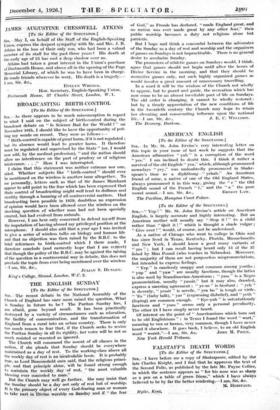BROADCASTING BIRTH-CONTROL [To the Editor of the SPECTATOR.] to what
I said on the subject of birth-control during the SIR,—As there appears to be much misconception in regard
broadcast debate on " Is Science' Bad for the World ? " on November 16th, I should like to have the opportunity of put- ting my words on record. They were as follows :- " Birth-control is capable of great harm, if it is not regulated ; but its absence would lead to greater harm. It therefore must be regulated and supervised by the State " (or, I would now add, by the medical profession), " and the nation should allow no interference on the part of prudery or of religious intolerance. . . ." Her I was interrupted.
I claim that this statement was neither extreme nor one_ sided. Whether subjects- like " birth-control " should ever be mentioned on the wireless is another issue altogether. To me personally, letters such as that of Sir James Marchant appear to add point to the fear which has been expressed that State control of broadcasting might well tend to -dullness and sterility through a .banning of all controversial matters. Had broadcasting been possible in 1859, doubtless no expression of opinion would have been allowed over .the wireless on the shocking_ question of whether man had not been specially created, but had evolved from animals. However, I am here only concerned to defend myself from the imputation of having abused my privileged position at the Microphone. I should also add that a year- ago I was invited to give a series of wireless talks on biology and human life and that no objection was then raised fiy the B.B.C. to the brief references to birth-control which I there made. I therefore conclude (and earnestly hope that I am correct) that though the policy of the B.B.C. may be against the raising of the question in a controversial way- in debate, this does not preclude the topic from ever being mentioned over the wireless —I am; Sir, &c., Juunx S. HUXLEY.
King's College, Strand, London, W.C. 2.






























































 Previous page
Previous page